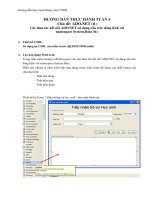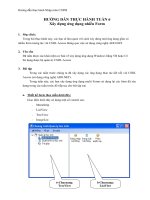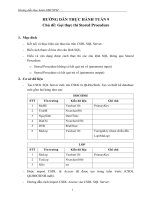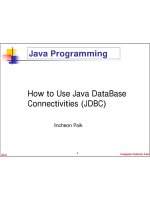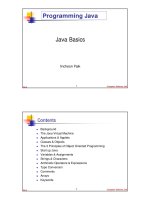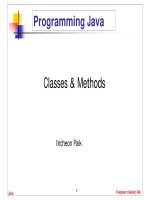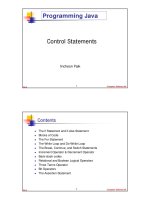Java - Trang ď Chap05
Bạn đang xem bản rút gọn của tài liệu. Xem và tải ngay bản đầy đủ của tài liệu tại đây (70.56 KB, 12 trang )
Programming Java
Creating Classes
Incheon Paik
1
Java
Computer Industry Lab.
Contents
Java
The General Form of a Class
Creating Simple Classes
Adding Constructors
Constructor Overloading
The this Keyword
Instance Variables and Instance Methods
Static Variables and Static Methods
Local Variables and Variable Scope
Method Overloading
Argument Passing
Generic Class Types
2
Computer Industry Lab.
The General Form of a Class
Declaration of a Class
Class clsName {
// instance variables
Type1 varName1 = value1;
Type2 varname2 = value2;
……
typeN varNameN = valueN;
//Constructors
clsName(cparams1) {
// body of constructor
}
……..
clsName(cparamsN) {
// body of constructor
}
// Methods
Rtype1 mthName1(mparams1) {
// body of method
}
……
Rtype1 mthName1(mparams1) {
// body of method
}
}
3
Java
Computer Industry Lab.
Creating Simple Classes
A Simple Form
class Sample {
Sample one = new Sample();
int a;
int b;
int c;
}
System.out.println(“p.x = “ + p.x);
class Point3D {
System.out.println(“p.y = “ + p.y);
double x;
System.out.println(“p.z = “ + p.z);
double y;
}
double z;
}
}
Class Point3DExample {
public static void main(String args[]) {
Result :
p.x = 1.1
Point3D p = new Point3D();
p.x = 1.1;
p.y = 3.4
p.y = 3.4;
p.z = -2.8
p.z = -2.8;
Java
4
Computer Industry Lab.
Adding Constructors
Class Point3DExample {
class Point3D {
double x;
double y;
Constructor
public static void main(String args[]) {
Point3D p = new Point3D(1.1, 3.4, -2.8);
System.out.println(“p.x = “ + p.x);
double z;
Point3D (double ax, double zy, double az) {
x = ax;
y = ay;
z = az;
}
System.out.println(“p.y = “ + p.y);
System.out.println(“p.z = “ + p.z);
}
}
}
Result :
p.x = 1.1
p.y = 3.4
p.z = -2.8
5
Java
Computer Industry Lab.
Constructor Overloading
Signature : The information to distinguish
methods such as the method name, no. of
parameters,data types of parameters, the return
type
class Point3DExample {
public static void main(String args[]) {
Point3D p = new Point3D(1.1);
System.out.println(“p.x = “ + p.x);
class Point3D {
System.out.println(“p.y = “ + p.y);
double x;
System.out.println(“p.z = “ + p.z);
double y;
double z;
Point3D (double ax) {
x = ax;
y = 1;
z = 1;
}
Point3D (double ax, double zy) {
x = ax;
y = ay;
z = 1;
}
Point3D (double ax, double zy, double az) {
x = ax;
y = ay;
z = az;
}
}
Java
Point3D p = new Point3D(1.1, 3.4);
System.out.println(“p.x = “ + p.x);
System.out.println(“p.y = “ + p.y);
System.out.println(“p.z = “ + p.z);
Point3D p = new Point3D(1.1, 3.4, -2.8);
System.out.println(“p.x = “ + p.x);
System.out.println(“p.y = “ + p.y);
System.out.println(“p.z = “ + p.z);
}
}
6
Computer Industry Lab.
The this Keyword
class ThisKeywordDemo {
this Keyword
public static void main(String args[]) {
Point3D p = new Point3D(1.1, 3.4, -2.8);
this.varname
System.out.println("p.x = " + p.x);
System.out.println("p.y = " + p.y);
System.out.println("p.z = " + p.z);
Invocation of Constructors
}
this(args);
}
class Point3D {
double x;
double y;
double z;
Point3D(double x, double y, double z) {
this.x = x;
this.y = y;
this.z = z;
}
}
7
Java
Computer Industry Lab.
Instance Variables & Instance Methods
Declaration of an Instance Variable
Type varName1;
Declaration of Multiple Instance Variables
Type varName1, varname2, … varNameN;
Refer to the
supplement
material for more
detailes
Declaration of an Instance Variable & Initialization
Type varName1 = expr1;
Declaration of Multiple Instance Variables & Initialization
Type varName1, varname2 = expr2, … varNameN;
Declaration of an Instance Method
rtype mthName (mparams) {
// body of method
}
Java
8
Computer Industry Lab.
Instance Variables & Instance Methods
class Bag {
Result :
boolean flag;
false
int i, j=2, k=3, l, m;
0
double array[] = {-3.4, 8.8e100, -9.2e-100 };
2
String s1, s2= new String(“Hello”);
3
}
0
class BagTest {
public static void main(String args[]) {
0
Bag bag = new Bag();
-3.4
System.out.println(bag.flag);
8.8E100
System.out.println(bag.i);
-9.2E-100
System.out.println(bag.j);
null
System.out.println(bag.k);
Hello
System.out.println(bag.l);
System.out.println(bag.m);
for (int i=0; i < bag.array.length; i++)
System.out.println(bag.array[i]);
system.out.println(bag.s1);
system.out.println(bag.s2);
}
}
9
Java
Computer Industry Lab.
Instance Variables & Instance Methods
class Point3D {
double x;
double y;
double z;
Class Point3DMethod {
public static void main(String args[]) {
Point3D p = new Point3D(1.1, 3.4, -2.8);
System.out.println(“p.x = “ + p.x);
System.out.println(“p.y = “ + p.y);
Point3D (double ax) {
x = ax;
y = 1;
z = 1;
}
Point3D (double ax, double ay) {
x = ax;
y = ay;
z = 1;
}
Point3D (double ax, double ay, double az) {
x = ax;
y = ay;
z = az;
}
// Instance Method
void move(double x, double y, double z) {
this.x = x;
this.y = y;
this.z = z;
}
Java
System.out.println(“p.z = “ + p.z);
p.move(5,5,5);
System.out.println(“p.x = “ + p.x);
System.out.println(“p.y = “ + p.y);
System.out.println(“p.z = “ + p.z);
}
}
Result :
p.x = 1.1
p.y = 3.4
p.z = -2.8
p.x = 5.0;
p.y = 5.0;
p.z = 5.0;
10
Computer Industry Lab.
Static Variables & Static Methods
Declaration of a Static Variable
static type varName1;
Declaration of Multiple Static Variables
static type varName1, varname2, … varNameN;
Refer to the
supplement
material for more
detailes
Declaration of a Static Variable & Initialization
static type varName1 = expr1;
Declaration of Multiple Instance Variables & Initialization
static type varName1, varname2 = expr2, … varNameN;
The Static Initialization Block
class clsName {
static {
// block of statement
}
}
11
Java
Computer Industry Lab.
Static Variables & Static Methods
class Thing {
static int count;
String name;
Declaration of a Static Method
static rtype mthName(mparams) {
// body of method
Thing(String name) {
this.name = name;
++count;
}
}
//
Class StaticVariable {
public static void main(String args[]) {
Thing t1 = new Thing(“Bowling Ball”);
System.out.println(t1.name + “ ” + t1.count);
Thing t2 = new Thing(“Ping Pong Ball”);
System.out.println(t2.name + “ ” + t2.count)
Thing t3 = new Thing(“Football”);
System.out.println(t3.name + “ ” + t3.count)
}
}
}
class StaticBag {
static boolean flag;
static int i, j=2, k=3, l, m;
static double array[] = {-3.4, 8.8e100, -9.2e-100 };
static String s1, s2= new String(“Hello”);
}
class BagTest {
public static void main(String args[]) {
Bag bag = new Bag();
System.out.println(StaticBag.flag);
System.out.println(StaticBag.i);
System.out.println(StaticBag.m);
for (int i=0; i < bag.array.length; i++)
System.out.println(StaticBag.array[i]);
System.out.println(StaticBag.s1);
System.out.println(StaticBag.s2);
}
}
Java
Result :
Bowling Ball 1
Ping Pong Ball 2
Football 3
12
Computer Industry Lab.
Static Variables & Static Methods
class X {
static int array[];
static {
array = new int[6];
for (int i = 0; i < 6; i++)
array[i] = i;
}
}
class StaticInitializationBlock {
public static void main(String args[]) {
for (int i=0; i < 6; i++)
System.out.println(X.array[I]);
}
}
class LinearEquation {
static double solve(double a, double b) {
return –b / a;
}
}
class StaticInitializationBlock {
public static void main(String args[]) {
System.out.println(LinearEquation.solve(2,2));
}
}
Result :
-1.0
Result :
0
Refer to the
supplement
material for more
detailes
1
2
3
4
5
13
Java
Computer Industry Lab.
Local Variables and Variable Scope
class MyObject {
static short s = 400; // static variable
int i = 200;
void f() {
System.out.println(“s = ” + s);
System.out.println(“i = ” + i);
short s = 300; // local variable
short i = 100; // local variable
double d = 1E100; // local variable
System.out.println(“s = ” + s);
System.out.println(“i = ” + i);
System.out.println(“d = ” + d);
}
}
class LocalVariables {
public static void main(String args[]) {
MyObject myObject = new MyObject();
myObject.f();
}
}
class X {
void f() {
for( int j=0; j<5; j++) {
int k=100;
System.out.println(“j= “ + j + “; k= “ +k);
}
}
}
class VariableScope {
public static void main(String args[]) {
X x = new X();
x.f();
}
}
Result :
j = 0; k = 100
j = 1; k = 100
Result :
s = 400
i = 200
s = 300
i = 100
d = 1.0E100
j = 2; k = 100
j = 3; k = 100
j = 4; k = 100
Java
14
Computer Industry Lab.
Method Overloading
class Point3D {
double x;
Overloaded Methods
double y;
double z;
Point3D (double x) {
this(x,0,0);
}
Point3D (double x, double y) {
this(x,y,0);
}
Point3D (double x, double y, double z) {
this.x = x;
this.y = y;
this.z = z;
}
void move(double x, double y, double z) {
this.x = x;
this.y = y;
this.z = z;
}
void move(double x, double y) {
this.x = x;
this.y = y;
}
void move(double x) {
this.x = x;
}
}
Class Point3DOverloadMethods {
public static void main(String args[]) {
Point3D p = new Point3D(1.1, 3.4, -2.8);
p.move(5);
System.out.println(“p.x = “ + p.x);
System.out.println(“p.y = “ + p.y);
System.out.println(“p.z = “ + p.z);
p.move(6,6);
System.out.println(“p.x = “ + p.x);
System.out.println(“p.y = “ + p.y);
System.out.println(“p.z = “ + p.z);
p.move(7,7,7);
System.out.println(“p.x = “ + p.x);
System.out.println(“p.y = “ + p.y);
System.out.println(“p.z = “ + p.z);
}
}
Result :
p.x = 5.0
p.x = 7.0
p.y = 3.4
p.x = 7.0
p.z = -2.8
p.x = 7.0
p.x = 6.0;
p.y = 6.0;
p.z = -2.9;
15
Java
Computer Industry Lab.
Argument Passing
Call by Value
class ArrayArgument {
public static void main(String args[]) {
// variable initialization
int x[] = {11, 12, 13, 14, 15};
//variable display
Result :
11 12 13 14 15
display(x);
11 12 13 14 15
// method invocation
change(x);
// variable display
} // end of main
public static void change(int x[]) {
Refer to the
supplement
material for more
detailes
int y[] = {21,22,23,24,25};
x = y;
}
public static void display(int x[]) {
for (int i=0; i < x.length; i++)
System.out.print(x[i] + “ “);
} // end of class
} // end of class
Java
16
Computer Industry Lab.
Generic Class Types
Generic Type : Referred to as Parameterized Type , a class or interface type definition
that has one or more type parameters. Define an actual class or interface type from a generic
type by supplying a type argument for each of the type parameters that the generic type has.
Generic Type
LinkedList
Specify T as
String
Specify T as
PolyLine
Specify T as
Point
LinkedList<String>
LinkedList<Point>
LinkedList<PolyLine>
That defines an object to store
String object references in a
linked list
That defines an object to store
Pint object references in a
linked list
That defines an object to store
PolyLine object references in a
linked list
17
Java
Computer Industry Lab.
Defining a Generic Class Type
Defining a Generic LinkedList Class
A LinkedList Case
public class LinkedList<T> {
// Generic Type Definition….
}
Instantiating a Generic Type
LinkedList<String> strings;
LinkedList<String> strings = new LinkedList<String>();
LinkedList
Generic Types and Generic Interfaces
public class MyClass<T> implements MyInterface<T> {
// Details of the generic type definitions
}
import java.util.Iterator;
public class LinkedList<T> implements Iterable<T> {
public Iterator<T> iterator() { // Code to return a reference to an iterator for this list… }
// Rest of the Linked List<T> generic type definition as before …
}
Java
18
Computer Industry Lab.
Defining a Generic Class Type
Code Examples of LinkedList and PolyLine
/> /> /> />
Code Examples of LinkedList,
LinkedList, CollectionCollection-Based for Loop, and AutoBoxing
/> />EnablingForLoop/Point.java
/>EnablingForLoop/PolyLine.java
/>EnablingForLoop/TryAutoboxing.java
19
Java
Computer Industry Lab.
Exercise
Step 1 (Make a Class Method)
You can fill the method as the fashion of other methods.
Step 2 (Call by Reference)
Write a class for “call by referencing”.
public static void swap(Swap obj) {
// Object variable swapping
}
Step 3 Static Variables & the finalize
Method
Java
Need to understand static variables : Static Variables are shared among
objects
When some objects are not used any more and the garbage collector is
invoked, the finalized method of the object will be invoked before the
garbage collector reclaim the memory.
20
Computer Industry Lab.
Exercise
Step 4, A Static Inner Class
Able to use static variables
OuterClass.InnerClass
class
classOuterClass
OuterClass{{
////......
static
staticclass
classInnerClass
InnerClass{{
static
int
static intstaticVariable;
staticVariable;
////......
}}
}}
Can refer without creating object
[StaticInnerClass.java]
21
Java
Computer Industry Lab.
Exercise
class OuterClass {
static class InnerClass {
static String str;
InnerClass(String s) {
str = s;
}
void print() {
// Instance Method
staticPrint(str);
}
static void staticPrint(String s) {
// Static Method
str = s;
System.out.println(s);
}
} // end of InnerClass
} // end of OuterClass
public class StaticInnerClass {
public static void main(String[] args) {
String s = "... without creating Outer-class object";
OuterClass.InnerClass p = new OuterClass.InnerClass(s);
p.print();
OuterClass.InnerClass.staticPrint("call static method");
p.print();
}
}
Java
22
Guide:
When you solve this problem, you can
use this example directly. Some error
messages from compiler may give you
confusion. Therefore, refer to this
example carefully.
Run:
C:¥> java StaticInnerClass
Computer Industry Lab.
Exercise
Step 5 (Generic Class Types)
Java
Related Slides : #17,18,19
23
Computer Industry Lab.
